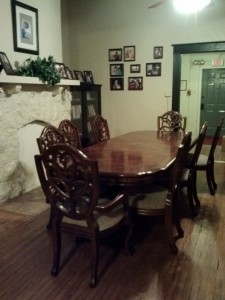What Happened to My Home
By: Max Groce
I didn’t really know where to start on this blog about my Volunteering at the Dorothy Day House. I’ve never even been close to being homeless in my life. We lived in a small house when I was a kid but it was all my family ever needed and in my eyes it was perfect; it was warm in the winter and dry in the rain. So I’m here trying to think and all I can come up with is, “what in the heck do I know about being homeless?”
I go to the store to pick up cupcakes for dessert for the Dorothy Day House. I drive down 240 and get off on poplar and I arrive at the house. From the front it looks like a regular large old midtown Memphis house. I pull around the narrow alley around back and park; I ring the back door bell and I’m greeted by Sister Maureen. She ushers me into the living room where we sit down and she tells me what the house is all about. The house is definitely old it still has most of its original molding but it still looks good; there are pictures all over the dinner room of the families that have stayed at the house. I sit on a chair in the living room opposite of Sister Maureen and one of the other volunteers, Mr. Paul, who comes to lead in prayers. Sister Maureen starts to tell me how she started the house. She saw homelessness as a real problem, especially when it came to families. Most of the time when a family becomes homeless they are forced to split up. For example, men over a certain age go to the missions. Women, girls, and young girls might go the Salvation Army in Jackson and teenagers could end up somewhere in foster care. You have to realize that all of this is contingent upon whether there is room at these places; if there is not room, and then they’re on the street. Sister Maureen let me know that there are usually close to 200 families on the street homeless in Memphis.
So to combat this, Sister Maureen opened the Dorothy Day House which houses about 3 families rent free. Not only does she house them, she helps the children get into the nearby schools, and the adults find employment. She tells me that the reason she believes this works is that it doesn’t feel like an institution. It feels like the most important thing, it feels like a home. They’re allowed to be together and feel each other’s support. A family arrives soon after we finish stalking and Mr. Paul leads us in prayer and then we have dessert and coffee. It’s incredible to hear the family’s story, and you start to imagine the stories of all the pictures on the walls. Sister Maureen explained some of them to me and they all have a pretty common characteristic. It all starts with somebody trying to better themselves or get their family into a better place, then something tragic happens and then they fall with no safety net.
I finish my coffee and talking to the family at the table and Sister Maureen then I my way home. It’s on the car ride home that the little acts of kindness things truly started to make sense. Sister Maureen didn’t start some huge organization with hundreds of thousands of dollars, all she did was take in three families in desperate need off the street and it made it all the difference in the world. She gave them the thing that we take for granted so much; she gave them a home. A place to lay their heads and safety at least for a little while. She gave the adults the peace of mind that at least their kids get to sleep in a bed. It’s crazy to think about all the things that we complain about. Me not excluded – I mean I lose my head when my Wi-Fi doesn’t work in my house but when I really start to think about it, it seems so distantly insignificant compared to the thought of not being able to be with my family.
I have to say out of all the work I did this week the Dorothy Day House had the biggest impact on me. When I got back from volunteering I did some reading and I ran across my quote that put into some perspective. The quote is by Wallace Stegner and it says, “Home is a notion that only nations of the homeless fully appreciate and only the uprooted can comprehend.” After volunteering, I was still far from understanding homelessness but I did have a better grasp of understanding hope and the little acts of kindness keep the despair and darkness at bay.
